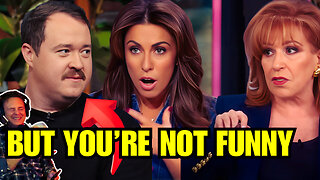Premium Only Content

When it comes to book publishing, can personalization beat quality?
I don’t often comment on book publishing, but Bo Sacks recently distributed an article called “The Imitation Game” by Ken Liu, and it caught my attention. The article is about whether AI will start writing all our bestsellers, and Ken’s somewhat tentative point is that an algorithm looking for the most likely “token” given a pre-existing set of tokens (which is approximately the way large language models work) must plateau at some point short of true intelligence.
My reaction to that is … maybe.
In the midst of his struggles with AI, Ken said this.
'Authors know that the idea that “good books” will prevail in the marketplace is a cruel joke. Publishers are very, very bad at connecting readers to books—that is why they are struggling.'
That got me thinking about the concept of good books and best sellers, and so on, so come along with me on a thought experiment by imagining the following lists.
List one is all the books that were written in 2022. That would include everything that was published – including self-published books – but it would also include manuscripts that never got out of the slush pile, for whatever reason.
List two contains good books from list one. Of course we’d have to come up with a standard for what constitutes a good book, but let’s pretend we had some reasonably objective measure for that.
List three is books that were picked up by publishers. That’s a very small percentage of all the books that were written, and, according to Ken, doesn’t overlap very well with the list of good books.
List four is books that became popular.
Let’s go back to the books that were picked up by publishers. Why does a publisher pick any particular book?
The Adam Smith answer is “because they think it will sell,” and I’ll grant you that most of the time, but it’s not the whole story. Sometimes they publish famous people’s books because it looks good for their brand, to curry favor, or for some other reason. And sometimes they publish books to meet diversity quotas, or to push some fashionable idea.
They’re not necessarily choosing “the best” books, nor the ones people most want to read, nor the ones most likely to sell.
Ken imagines a novel-writing AI called “ORWELL” that lives outside of the traditional publishing structure and tries to sell directly to the public. Its books aren’t necessarily better than human-written books, but they’re more targeted to individual readers. The book is exactly what you want to read, with all your foibles and strange tastes.
This could be an example where sales in the long tail – these one-off, personalized books – end up selling more copies than the best sellers.
So … why do we care? The general take-a-way here is that customization has the potential to beat quality, and also, it has the potential to beat all the marketing gimmicks, influencers, slick trailers, great advertising campaigns, etc.
Links
The Imitation Game, by Ken Liu
https://slate.com/technology/2023/06/book-publishing-artificial-intelligence-copyright.html
-
 UPCOMING
UPCOMING
The Mel K Show
1 hour agoMORNINGS WITH MEL K - Slow Rolling Disclosure Becoming Unstoppable Truth Tsunami - 10-24-25
4651 -
 12:29
12:29
Clintonjaws
15 hours ago $18.63 earnedShane Gillis vs 'The View' - This Is Priceless!
30.5K16 -
 LIVE
LIVE
Side Scrollers Podcast
1 day ago🔴SIDE SCROLLERS SUB-A-THON🔴FINAL DAY!🔴Craig Makeover + US Dart Throw + More!
1,170 watching -
 LIVE
LIVE
Major League Fishing
8 days agoLIVE! - Fishing Clash Team Series: Patriot Cup - Day 3
215 watching -
 LIVE
LIVE
Tudor Dixon
1 hour agoTed Nugent Sounds Off on Big Government Meddlers | The Tudor Dixon Podcast
77 watching -
 1:31:27
1:31:27
Stephan Livera
2 days ago $5.46 earnedDAY 1 - Stephan Livera hosts Plan B Podcast in Lugano
11.7K1 -
 LIVE
LIVE
LFA TV
15 hours agoLIVE & BREAKING NEWS! | FRIDAY 10/24/25
3,420 watching -
 LIVE
LIVE
Caleb Hammer
2 hours agoFinancial Audit's First Furry
154 watching -
 1:11:47
1:11:47
The Big Mig™
3 hours agoOperation Arctic Frost FAFO!
2.33K9 -
 1:01:47
1:01:47
VINCE
3 hours agoThere Is More Than Meets The Eye With Trump's Ballroom | Episode 154 - 10/24/25
115K151